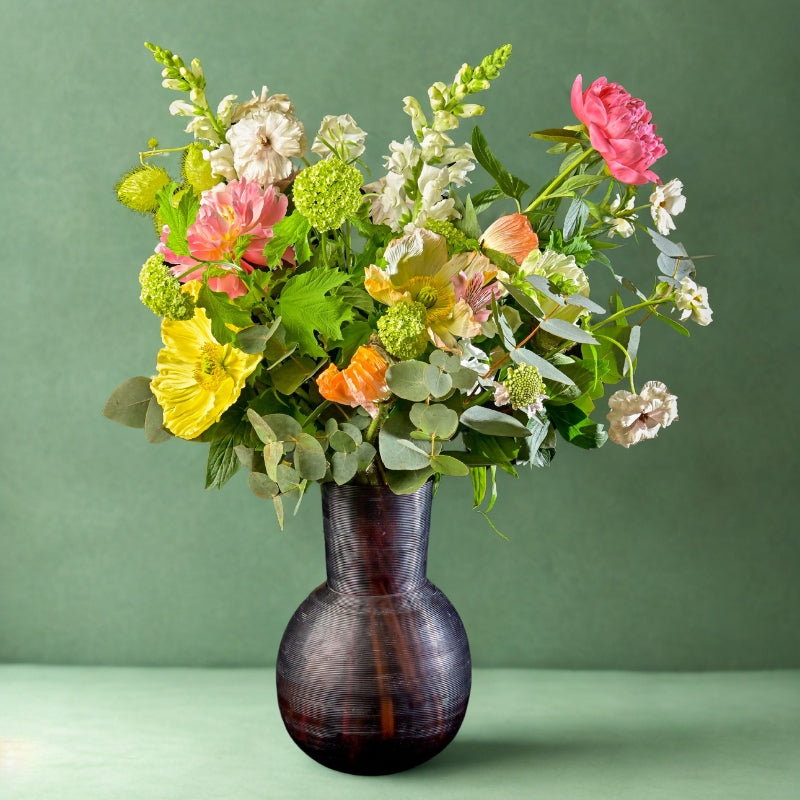The healing power of green:
Who hasn't felt a sense of peace while strolling through a garden? Plants, much more than just decorative elements, are true allies for our well-being. They positively influence our mood, our productivity, and even our physical health. Let's discover together how to integrate nature into our daily lives to reap all its benefits.
Plants, our well-being allies
- A shield against stress
Soothing effect Simply looking at green plants has a relaxing effect on our brains. The soft colors and rounded shapes of the leaves promote relaxation and reduce levels of the stress hormone cortisol. This visual interaction with plants creates a calming atmosphere, essential for alleviating the tensions of everyday life.
Improved Concentration Plants help reduce mental fatigue and improve concentration, especially in the workplace. The presence of greenery in professional spaces contributes to a more serene environment, thus increasing efficiency and the ability to focus on complex tasks.
- Natural air purifiers
Pollutant Absorption Many indoor plants, such as ficus or spathiphyllum, are veritable pollutant sponges. They absorb volatile organic compounds (VOCs) present in the air, such as benzene or formaldehyde, often emitted by building materials or household products. By purifying the air, these plants improve the quality of our indoor environment.
Increased Humidity: Some plants, such as spathiphyllum, naturally humidify the air, which can relieve respiratory problems and mucous membrane irritation. This natural humidification is especially beneficial in winter, when indoor air is often dried out by heating systems.
- A Boost of Creativity
Stimulates the imagination: Nature inspires creativity. Surrounded by plants, our minds are freer to wander and come up with new ideas. The varied shapes, colors, and textures of plants stimulate our brains and encourage innovation and original thinking.
Improved Concentration A green environment promotes concentration and productivity. Studies show that having plants in an office can increase productivity by 15%, partly due to improved air quality and reduced stress.
- More restful sleep
Creating a Sleep-Friendly Environment Indoor plants can help create a calm and soothing atmosphere in the bedroom. Lavender, for example, is known for its relaxing properties that promote better quality sleep.
Nighttime Air Purification Some plants, such as cacti, absorb CO2 at night and release oxygen, promoting restful sleep. This unique ability to purify nighttime air contributes to a healthier, more restful sleep environment.
Which plants to choose?
Air-purifying plants Plants such as ficus, spathiphyllum, sansevieria (or mother-in-law's tongue), and chlorophytum (or spider plant) are excellent for purifying the air. They are easy to maintain and particularly effective at removing common toxins from indoor air.
Aromatic plants Basil, mint, rosemary... In addition to their health benefits, these aromatic plants pleasantly scent your home and can be used in cooking. They also add a touch of greenery and freshness to your living space.
Succulents Easy to care for, succulents add a touch of modernity and cheerfulness. They require little water and are ideal for those without green fingers. Their unique appearance also makes them attractive decorative elements.
Flowering Plants Roses, tulips, orchids... Their vibrant colors and delicate fragrances enhance mood and bring a touch of beauty to any room. Flowering plants are perfect for adding an aesthetic dimension to your space while benefiting from their calming effects.
How to integrate plants into your daily life?
Create a Green Corner Designate a space in your home to display your plants. A shelf, coffee table, or windowsill may be sufficient. This space dedicated to greenery will become a place of relaxation and rejuvenation.
Opt for hanging plants Hanging plants are ideal for small spaces and add a touch of originality. They maximize the use of vertical space and create an urban jungle atmosphere.
Create a green wall For a complete immersion in nature, create a green wall with different plant species. This spectacular installation can transform any room into a green haven.
Incorporate plants into your kitchen. Herbs are perfect for hanging in your windowsill or in hanging pots. Not only are they practical for cooking, but they also add a touch of greenery to your kitchen space.
The psychological benefits of plants
Stress Reduction: Contact with nature has a calming effect on the nervous system. The presence of plants can help reduce anxiety and promote a sense of well-being.
Mood Boost Plants can help combat depression and anxiety. They add a touch of life and color to our environment, which can have a positive impact on our mood.
Increased Productivity A green work environment promotes concentration and creativity. Having plants in the office can lead to better performance and greater job satisfaction.
Tips for caring for your plants
Choose the right plants. Choose plants that are suited to the light level of your home and your experience level. Some plants require more care than others, so choose plants that fit your lifestyle.
Water regularly Each plant has its own water needs. Learn about your plants' specific needs and be careful not to overwater or underwater them.
Provide light If you lack natural light, use grow lights. Artificial light can compensate for the lack of sunlight and help your plants thrive.
Prune regularly Pruning helps keep your plants healthy and promote growth. Remove dead or yellowing leaves to encourage new growth and keep your plants in tip-top shape.
By incorporating plants into your daily life, you'll not only make your home a more pleasant place to live, but you'll also improve your physical and mental well-being. So, don't hesitate to surround yourself with greenery!








